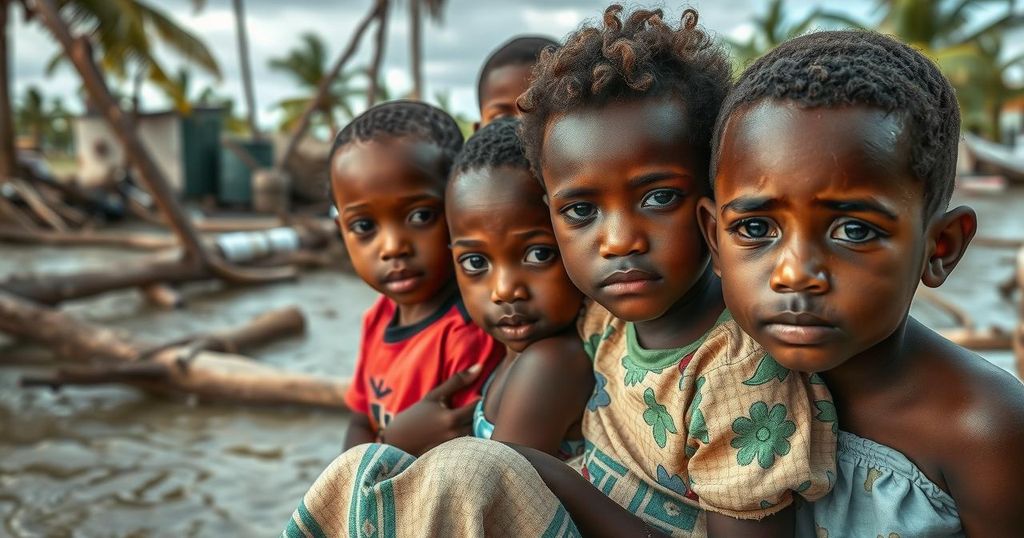UNICEF Reports Severe Impact of Cyclone Chido on Children in Mozambique

Tropical Cyclone Chido has severely impacted northern Mozambique’s Cabo Delgado province, affecting around 90,000 children and damaging over 35,000 homes. The storm exacerbates existing humanitarian crises, including conflict and disease outbreaks, as aid organizations respond to the urgent need for assistance amidst widespread destruction of infrastructure and displace thousands of families.
Tropical Cyclone Chido recently impacted northern Mozambique, particularly the Cabo Delgado province, resulting in grave challenges for approximately 90,000 children according to the United Nations Children’s Fund (UNICEF). The cyclone ravaged over 35,000 homes, displacing numerous families, and the storm’s aftermath reported an overall effect on at least 174,000 individuals. Furthermore, the destruction included at least 186,000 classrooms and 20 healthcare facilities, intensifying the existing humanitarian crisis in the region.
The cyclone made landfall near Pemba city, forcibly removing roofs, damaging vital infrastructure, and disrupting electricity and communication systems. Mary Louise Eagleton, UNICEF Representative in Mozambique, emphasized that the country faces acute threats from climate change, worsening conditions for children who were already suffering from conflicts, droughts, and diseases. UNICEF, along with other agencies, is prioritizing emergency humanitarian actions despite the inherent challenges faced by communities in Mozambique.
Cabo Delgado has contended with prolonged conflicts for seven years, displacing over 1.3 million people, primarily women and children. The cyclone has exacerbated existing hardships, destroying previously rebuilt homes and increasing vulnerability amidst a cholera outbreak. The World Health Organization (WHO) is mobilizing experts in the affected provinces, facilitating health assessments to determine urgent needs.
Within 48 hours post-cyclone, the UN refugee agency, UNHCR, commenced relief efforts in Pemba, where emergency supplies were distributed to over 2,600 individuals. Eujin Byun, a UNHCR spokesperson, remarked that initial assessments suggest nearly 190,000 individuals urgently require humanitarian assistance, with widespread school and home destruction reported.
UN Secretary-General António Guterres has confirmed that UN teams are mobilized and ready to provide additional support as necessary. However, ongoing challenges, including limited supplies, hinder effective disaster response. The Office for the Coordination of Humanitarian Affairs (OCHA) highlighted a $4 million allocation to support the early humanitarian response to this crisis.
Furthermore, the World Food Programme (WFP) aims to increase support for the nearly 3.3 million individuals expected to confront high levels of food insecurity in Mozambique next year. The cyclone also severely affected other regions, including Mayotte and southern Malawi, prompting ongoing assessments and coordination efforts to assist vulnerable communities.
The impact of climate change on Mozambique has led to successive natural disasters, with Tropical Cyclone Chido being the latest to exacerbate an already dire humanitarian situation. Cabo Delgado province, a region severely affected by prolonged conflict and instability, faced unique challenges as the cyclone inflicted widespread damage on housing, schools, healthcare facilities, and infrastructure. The vulnerability of children and families in this area is compounded by the ongoing crises, including cholera outbreaks and food insecurity, heightening the need for urgent humanitarian assistance.
In conclusion, Cyclone Chido has had devastating effects on northern Mozambique, particularly on children and families in Cabo Delgado province. Urgent humanitarian needs are rising significantly due to extensive damage to homes, educational institutions, and healthcare facilities. International organizations are actively responding, but challenges remain in delivering adequate assistance. The severity of the situation demands sustained global attention and support to restore stability and provide essential services to the affected populations.
Original Source: news.un.org






